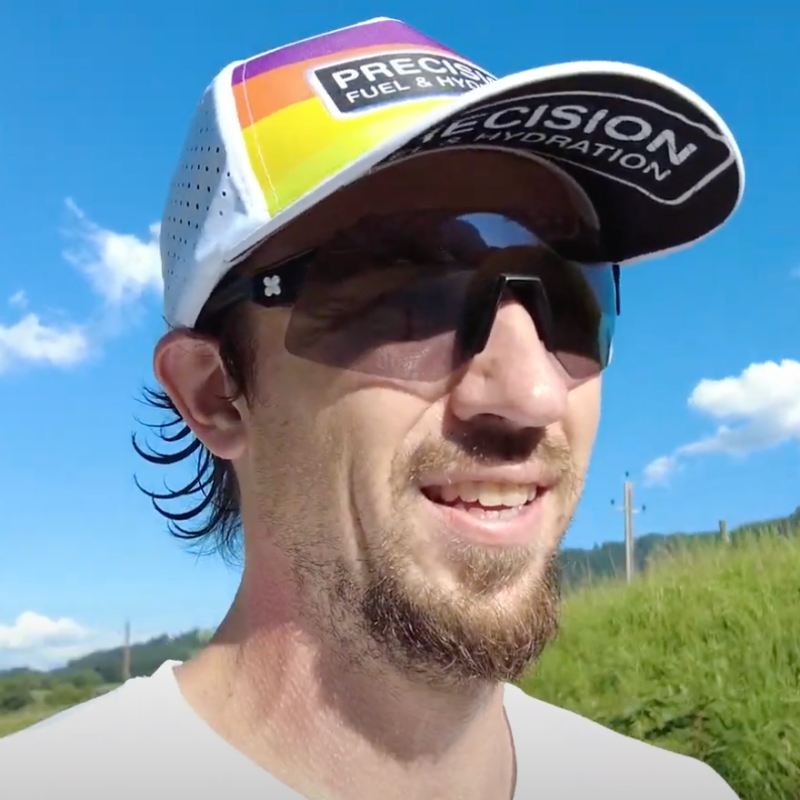
Jack Chamberlain
KAT 100 by UTMB
Jack's headline numbers
Jack's strategy
Fueling
Carbohydrate is the main fuel you burn when racing. Failing to fuel properly is a leading cause of underperformance in longer races.
Jack provided his working muscles with plenty of available energy during this race, using a good mixture of sports nutrition products including PF 30 Gels and PF Carb & Electrolyte Drink Mix to hit an average of ~101g of carb per hour, as well as incorporating real foods to keep him satiated when he was feeling hungry. Being able to consume this much carb per hour is testament to conditioning his gut through his prior training and racing. We’d typically recommend a little less carb per hour for an event of this duration and intensity (~75g/h or 90g/h) unless the athlete was as confident as Jack with their carb tolerance. One of the reasons Jack was able to achieve this impressive intake was by saving foods which required more effort to eat, such as chews and real food for hiking periods, while relying more on easy to consume gels on the downhills when he wanted to concentrate on his foot placement and speed.
Hydration
Taking on board an appropriate amount of fluid and sodium is essential to maintaining blood volume and supporting the cardiovascular effort needed to perform on race day.
Whilst the absolute amount of sodium and fluid consumed per hour is important, it’s critical to consider these in relation to each other. This is known as 'relative sodium concentration' and it’s expressed in milligrams per litre (mg/L). How much sodium you’re taking in per litre of fluid is more important than the absolute amount taken in per hour.
Jack did the right thing by adapting his intake on the fly based on frequent peeing. Usually this will either indicate overhydrating, or insufficient electrolyte intake resulting in the body being unable to retain fluid as effectively. In this situation Jack was maintaining an appropriate relative sodium concentration (~940mg/L). So, it’s more likely that the lower than expected temperature (as low as 3ºC / 37ºF in places) meant his sweat rate was lower than anticipated, which resulted in his fluid requirement also being less than he had planned for in his hydration strategy. His ability to adapt his intake according to the environment would have also helped him keep on top of his losses and ensure he wasn’t dehydrated when running in the valleys which were around 15ºC / 59ºF hotter than the highest points of the course.
Caffeine
Beyond the Three Levers of Performance (carb, sodium and fluid), caffeine is one of only a few substances that is proven to improve performance for most endurance athletes as it can help stave off mental and physical fatigue.
Because this event started in the evening, Jack had to adapt his usual pre-race caffeine habits. Usually he would take a shot of coffee in the morning, and one in the early afternoon, however here he tried to sleep during the day to allow him to feel more awake that night. Instead he had a double-shot of coffee with his pre-race dinner which would interact with the adenosine receptors in his brain and interfere with his circadian rhythm, making it slightly easier to run through the night. We would typically expect to see a higher caffeine intake during events of this duration, and this is something Jack can trial in his training before his next big event.
How Jack hit his numbers
Here's everything that Jack ate and drank on the day...
Jack's weapons of choice
Final thoughts
Jack's full stats
Data Confidence?
There is some confidence in the quantities and brands of products consumed but the data may lack specifics (e.g. volumes specific flavours). A high number of estimations have been made and the room for error is moderate-high. There may also be the possibility that some intake has been grossly over- or under-estimated.